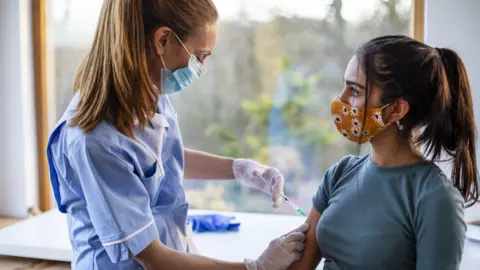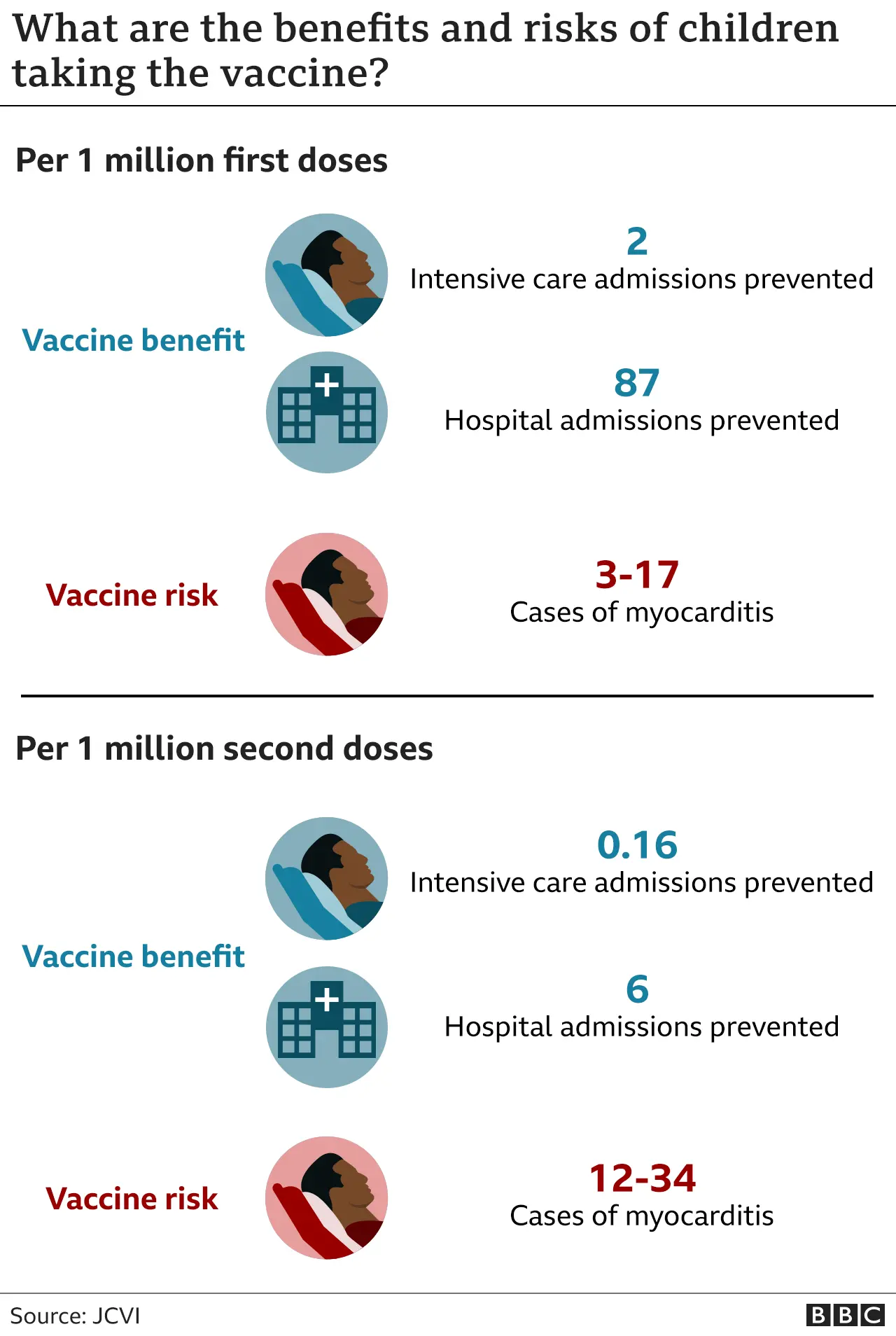Covid vaccines for 12 to 15-year-olds: What we know so far
 Getty Images
Getty ImagesAll children aged 12 to 15 in Wales will be offered a Covid vaccine by the end of October.
Some of the most vulnerable children have already received the vaccine and the rollout is due to gather pace this week.
But what are the potential benefits and risks of giving younger people a Covid jab? What about consent? Will it help reduce Covid cases in schools? When and where will it happen?
Here is everything we know so far.
What is the benefit of my child having a Covid vaccine?
The Welsh government is emphasising the vaccine is a choice for each individual to make.
Last month the UK's vaccine advisory body JCVI refused to give the green light to vaccinating healthy 12 to 15-year-olds on health grounds alone.
It said children were at such a low risk from the virus that jabs would offer only a marginal benefit.
The UK's four chief medical officers (CMOs) were then asked to have the final say, and to consider the wider impact on schools and society.
The CMOs then said healthy children aged 12 to 15 should be offered one dose of a Covid vaccine after taking into account evidence on the mental health and long-term prospects for young people and the effect on education, combined with the marginal benefit to health.
As with adults, the vaccine is not 100% effective but cases should be less severe and Covid is generally a mild illness in children.
Health Minister Eluned Morgan said studies showed children were at some risk of developing long Covid despite low hospital admission rates.
"Vaccines remain our strongest defence from the virus, helping prevent harm and stopping the spread of Covid-19," she said.
"Some studies show one in seven children who have been infected with the virus are thought to have also developed long Covid."
Does the Covid vaccine pose any risks to my child and, if so, what are they?
No vaccine or drug is ever 100% safe.
Research suggests there is a tiny risk of myocarditis, or inflammation of the heart, which is more common in young people - and particularly younger boys - after a second dose.
The risk is tiny after one vaccine dose and slightly higher after two, with 12 to 34 cases seen for every one million second doses - under-18s are only being given one dose at the moment.
Myocarditis can cause chest pain and a pounding heart, but symptoms usually clear up within days.
There is other evidence that Covid itself can lead to heart problems on very rare occasions.


The CMOs said 12 to 15-years-olds having a Covid vaccine would improve their wellbeing - in what way?
The decision to recommend the vaccine took into account the mental health and long-term prospects for young people and the effect on education, amongst other factors.
The UK CMOs said missing school was detrimental to children's wellbeing, particularly for children from poorer backgrounds.
But they could not say with confidence how much impact vaccinating this age group would have on keeping children in school and allowing them to go about their usual activities.
On balance, they think it will help but emphasise that vaccination will not by itself stop Covid cases having an impact on schools or keeping children in classrooms.
What led Wales' Chief Medical Officer to come to a different conclusion to the JVCI?
The JVCI looked strictly at the health benefits which they said were marginally in favour, but not significant enough to recommend the rollout of the vaccine to 12 to 15-year-olds.
They suggested the four UK CMOs might want to take other factors into account and, after assessing the wider impact on children's lives and education, they recommended in favour.
How many children are getting Covid?
Those aged 19 and under currently make up 47% of positive tests.
At a similar point in the second wave, also the day that the vaccine programme began, it was only 16%.
More than a third of positive tests are among those aged 10 to 19.
In the latest week, there were 2,336 cases linked to schools - a 44% drop from the 4,187 cases recorded in the previous week.
What are the repercussions if I choose not to have my child vaccinated?
It has been stressed that the vaccine is a choice for each family and is not compulsory.
When are the vaccinations happening?
They have already started in some areas but will be up and running across Wales this week.
Invitations are being sent out and appointments are mainly on weekends and after school hours to avoid disrupting classes.
Where are they happening?
In the same vaccination centres where adults are getting jabbed.
But they may happen in some schools too. This is different to England and Northern Ireland where they are mainly happening in schools.
How is it different to adult jabs?
At the moment, 12 to 17-year-olds are only being offered one dose of the Pfizer vaccine.
Under-16s should have a parent or carer with them when they go to their appointment.
What about consent?
Families are being urged to discuss the pros and cons of vaccination and, if there is any disagreement, 12 to 15-year-olds can give consent for themselves if they are judged to be competent to decide.
Will it help reduce Covid cases in schools?
Not in the short term as it will take some weeks to build up immunity.
So far this term, there have been more than 10,000 positive cases among school children and staff in Wales.
Overall, the chief medical officers have judged that it will help to limit the amount of school children who miss lessons due to Covid, while warning that it's not a silver bullet.
What about take-up?
That will not be clear until October half-term when all children in the age group should have been offered an appointment.
More than 70% of 16 and 17-year-olds have had their first vaccination.

- DEAR MRS CAMPBELL: A letter of celebration to Wales' first black headteacher
- THE CASABLANCA: How a Cardiff nightclub changed our lives

